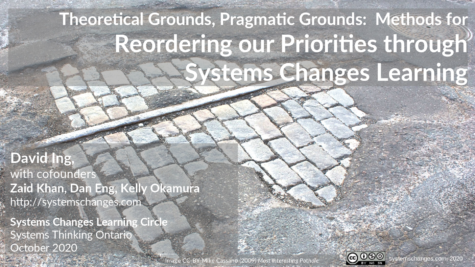For the second of three workshops by the Systems Changes Learning Circle in October 2020, we convened a session for the monthly Systems Thinking Ontario meeting. The focus of this workshop was a review of progress to date on methods by the scholarly team, informed by the adoption and use by the field team.
The framing of this presentation centered on developing methods that have validity balanced between theoretical grounds (i.e. it seems right based on logic and science) and pragmatic grounds (i.e. it works when applied in practice).
This workshop had more of a “teach-the-teachers” style to it, explaining the deeper choices in concepts, terms and techniques. Compared to the other two workshops, this audience has a stronger grasp of systems theory. Many regular attendees have attended meetings over the past 5 years.
In the web video , the presentation slides were mostly covered sequentially. Attendees clarified their understandings with questions posed towards the end.
The video file are downloadable from the Internet Archive .
| Video | H.264 MP4 |
| October 19 (1h57m) |
[20201019_ST-ON_SystemsChanges.m4v] (FHD 806kbps 790MB) [on the Internet Archive] |
For those who like digital audio on-the-go, the session has been transcoded to MP3 .
| Audio | |
| October 19 (1h57m) |
[20201019_ST-ON_SystemsChanges.mp3] (44MB) |
This session extended prior presentations on Systems Changes, with the benefit of the RSD9 version oriented towards designers having been completed just a few days earlier. The freshness of that experience encouraged a reflections on ideas that had gone over over well fort the designers, as well as some examples and metaphors that may need to be rethought.
The framing of reordering priorities seems to work well, as participants are led to make the distinction between (i) the urgent and the important, and (ii) the local and the distant. A workshop of just a few hours doesn’t allow for effectively covering the 5 learnings, with the timebox barely allowing a mention.
While the Systems Changes Learning Circle saw itself as only in the second year of a 10-year journey, it’s important to voice our ideas in open discussion, and see what sticks. The basic framework seems sound. We’ll need more time to flesh out the details.
Slides are available on the Coevolving Commons.



